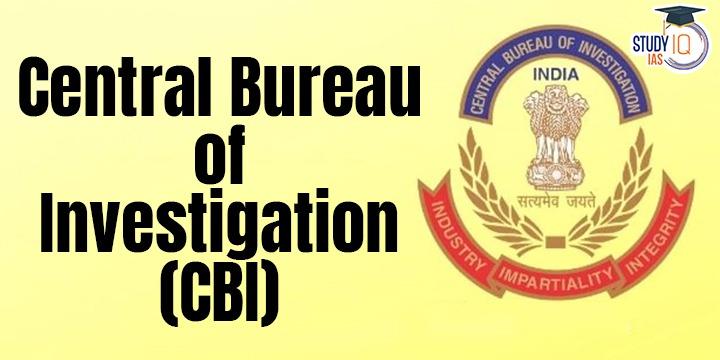Table of Contents
Central Bureau of Investigation (CBI)
- It functions under the Department of Personnel, Ministry of Personnel, Pension & Public Grievances of the Government of India.
- It is not a statutory body; it derives its powers from the Delhi Special Police Establishment Act, 1946.
- It works under the supervision of the CVC (Central Vigilance Commission) in matters of the Prevention of Corruption Act, 1988.
- Supreme Court in Vineet Narain & Others vs Union Of India & Anr, 1977:
- Fixed the tenure of the Central Bureau of Investigation (CBI) Director at two years,
- gave statutory status to the Central Vigilance Commission (CVC).
- A panel headed by the CVC and including top secretaries to the Union government would draw up a panel from which the Director of the ED would be selected.
- The Lokpal Act, 2013: It laid down that the Central Bureau of Investigation (CBI) Director should be chosen, unanimously or by majority vote, by a search committee headed by the Prime Minister and also comprising the Leader of Opposition and the CJI or his representative, from a list of candidates drawn up by the Home Ministry and examined by the Department of Personnel and Training.

Central Bureau of Investigation: Challenges
- Structurally constrained: The Central Bureau of Investigation India has been stymied both by the legal structure within which it functions, and by the changes made by governments in the Rules governing it. Over the years, these have progressively made the agency subservient to the Union government.
- Biased Execution: To prosecute any MLA, state minister, or MP, the Central Bureau of Investigation (CBI) needs sanction from the Speaker of the state Assembly (in case of MLAs) or the Governor (for state ministers).
- In the case of an MP, sanction is sought from the Speaker of Lok Sabha or Vice Chairman of Rajya Sabha.
- Since all these sanctioning authorities are connected to the ruling dispensation, Opposition parties feel they are unfairly targeted.
- State Consent: As many as nine states have withdrawn general consent to the Central Bureau of Investigation (CBI), usually over political considerations.
- CBI needs consent of a state to probe offences in the state’s jurisdiction,
- It leads to Centre-state friction and also impedes the Central Bureau of Investigation (CBI) operation in important cases, causing avoidable delays.
- Lack of Framework: Present constitutional and statutory framework does not provide any guidance regarding the kinds of cases which the Central Bureau of Investigation (CBI) ought to prioritise and investigate.
- Pleasure of Government: Government in 2021, amended the DSPE Act to give the Central Bureau of Investigation (CBI) Director a tenure of five years.
- However, after completion of the SC-mandated two-year tenure, the Director would get an extension of tenure each year at the pleasure of the government.
Judiciary’s Concern w.r.t. Central Bureau of Investigation (CBI)
- In May 2013, Supreme Court Bench headed by Justice R M Lodha described the CBI as “a caged parrot speaking in its master’s voice”.
- In 2019, then CJI Ranjan Gogoi had questioned the role of the CBI in “politically sensitive” cases, and said that it reflected “a deep mismatch between institutional aspirations” and “governing politics”.
- On April 1 this year, then Chief Justice of India (CJI) N V Ramana lamented that the agency had gone from being the people’s most trusted to the subject of deep public scrutiny.

Central Bureau of Investigation: Way Forward
- A dedicated and separate law that can provide Central Bureau of Investigation (CBI) with unequivocal statutory backing.
- It will specify the CBI’s organisational structure, a charter of functions, the types of offences it can investigate, and the nature of its superintendence and oversight.
- It will help in consolidating the CBI’s legal framework, which is presently scattered across other statutes like the Central Vigilance Commission and Lokpal Acts,
- Harmonise relationship between the Central Bureau of Investigation (CBI) and state police, by including federal offences in the Union List of the Seventh Schedule of the Constitution.
- It will enable the Central Bureau of Investigation (CBI) law to designate certain crimes as federal offences, subject to statutorily defined criteria.
- Federal Offence: Law should allow the state police and the CBI to exercise concurrent jurisdiction over investigation of federal offences, with the CBI having precedence over the police. This would mean that state consent would not be required for the Central Bureau of Investigation (CBI) to investigate such offences.
- For non-federal offences: Present mechanism of requiring state consent should be retained, with the police having primary jurisdiction.
- It would establish a clear demarcation between the respective roles of the Central Bureau of Investigation (CBI) and the state police, while preserving the federal balance between the Centre and the states.
























 WhatsApp
WhatsApp